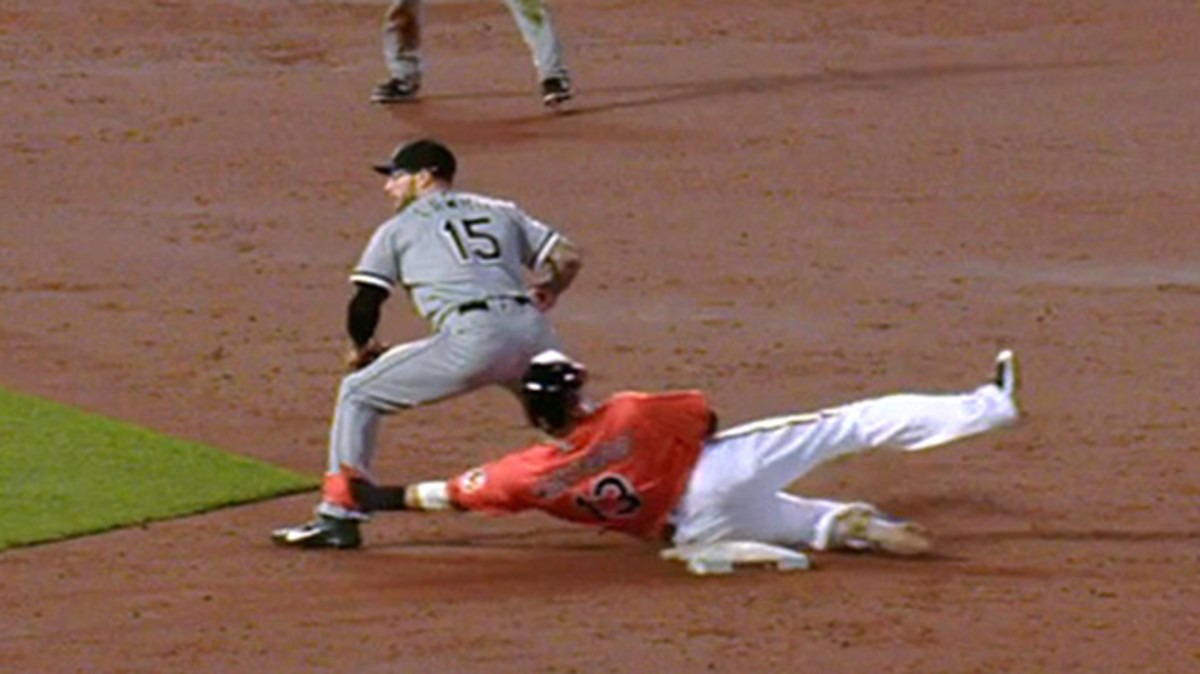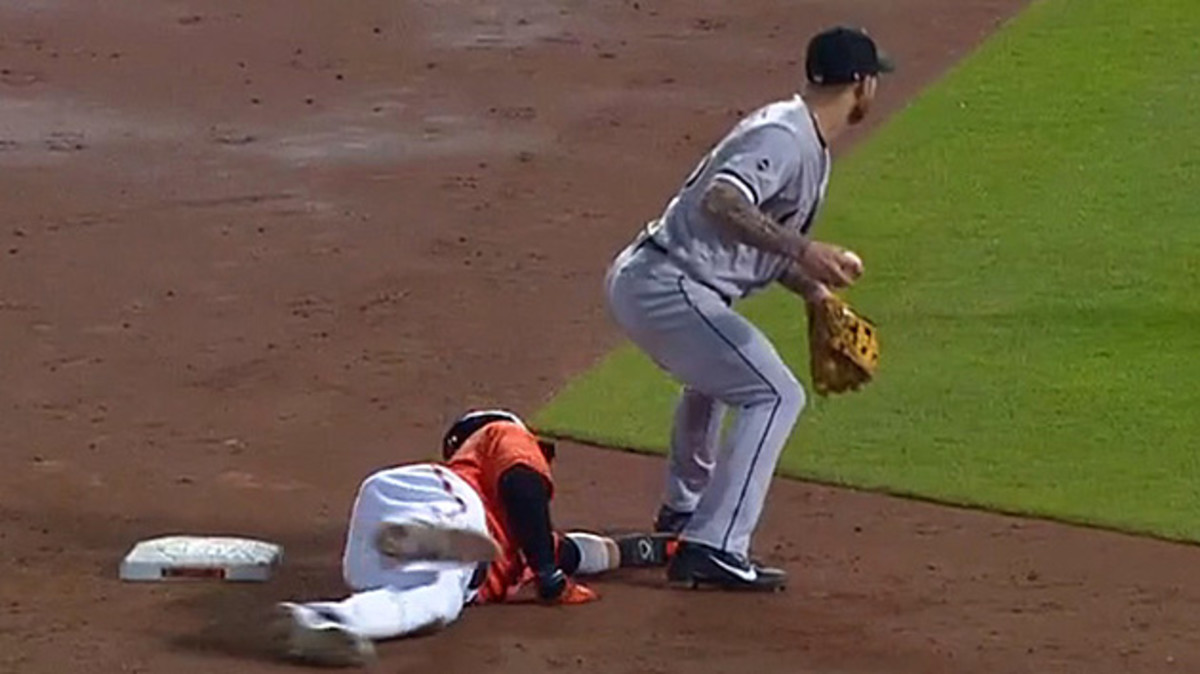Machado’s illegal slide exposes new rule’s inconsistent enforcement

Get all of Cliff Corcoran’s columns as soon as they’re published. Download the new Sports Illustrated app (iOS or Android) and personalize your experience by following your favorite teams and SI writers.
It may be divisive, but Major League Baseball’s rewritten rule regarding slides intended to break up double plays—Rule 6.01(j) in your rulebook, colloquially known as “the Chase Utley rule”—is nothing if not clear. As I explained to Joe Magrane on MLB Now during the first week of the regular season, the entire purpose of rewriting the rule (yes, rewriting, since the former rule 7.09(g) also prohibited attempting to break up a double play), was to eliminate any ambiguity and inconsistency in how and when the rule was applied. Unfortunately, that inconsistency has nonetheless reared its head, a blatant example of which took place in Saturday night’s 8–7 White Sox win over the Orioles in Baltimore.
In the bottom of the third inning, with no one out, Hyun Soo Kim on second base and Manny Machado on first, Adam Jones hit a ground ball to White Sox third baseman Todd Frazier. Frazier stepped on third to force out Kim, then threw to second baseman Brett Lawrie, who forced out Machado and turned to throw to first to attempt to complete what would have been a triple play. Lawrie did not make the throw. However, Machado’s slide into second base appeared to be in clear violation of rule 6.01(j). Despite that, Jones was ruled safe on the play, not out as he would have had been had the rule been enforced, and that ruling was upheld after a replay review.
#http://www.120sports.com/video/v175476654/ventura-gets-tossed
Much like Jose Bautista did to trigger a controversial game-ending interference call on the third day of the season, Machado reached out in the opposite direction of the base and grabbed the second baseman’s ankle as he slid by. When Bautista did that to Logan Forsythe on April 5, he was ruled to have violated Rule 6.01(j), resulting in an additional out at first base. Machado’s slide on Saturday was even more blatantly in violation than Bautista’s. Bautista slid directly toward second base and merely reached out his left hand at the last moment to sweep Forsythe’s foot. Machado slid to the inside of second base, ultimately ending up between the base and Lawrie, and not only reached out to grab Lawrie, but held on to him as he slid by. Yet, somehow, Machado was not cited for interference.
Take a look at the slide yourself.
Here’s a still of Machado hanging on to Lawrie as he slides by:

And here’s where Machado finished his slide (both images from the Orioles’ broadcast via MLB.com):

Once he slid to a stop, and after he made a weaker attempt to grab Lawrie’s right foot, Machado did reach back and touch second base with his left hand, thus technically cooperating with the first three parts of the four-part definition of a “bona fide slide” in the rule. Machado (1) began his slide before reaching the base (albeit barely), (2) was able to reach the base with his hand or foot (both feet made contact with the base) and (3) was able to remain on the base after the completion of the slide (again, sort of). However, he violated the fourth part of that definition by “changing his pathway for the purpose of initiating contact with the fielder.” Machado’s feet hit the bag, but the rest of his body was angled toward Lawrie, as evidenced by where he finished his slide.
Most significantly, he violated the long-standing, common-sense interference rule that runners cannot intentionally grab fielders who are in the process of making a play. That was the violation cited in Bautista’s case, and it is also contained within Rule 6.01(j) which prohibits the runner from “throwing his arm” to intentionally initiate contact with the fielder.
Inside Dee Gordon's PED ban, and what real penalty should be
There is no doubt that Machado’s slide was illegal. Yet, some may argue that it still shouldn’t have resulted in an out at first base because Lawrie did not make a throw to first. However, there is nothing in the rule that requires a throw to be made. Nor should there be. A fielder shouldn’t be required to make a wild throw in the hope of drawing interference call. Lawrie clearly pivoted in the hope of getting the out at first and is in throwing position in the still images above. Did he not make the throw because of Machado’s interference or because he didn’t think his throw would beat Jones to first? It doesn’t matter. The rule only states that, “if the umpire determines that the runner violated this Rule 6.01(j), the umpire shall declare both the runner and batter-runner out.” Machado clearly violated the rule. Jones should have been declared out.
A similar issue arose on another game-ending interference ruling three days after the Bautista decision. In that case, Colby Rasmus slid wide of and past second base in pursuit of Brewers shortstop Jonathan Villar. There was no contact on that play and Villar not only did not attempt a throw to second base but didn’t even cock his arm to start a throw. However, the interference call was made by the umpires on the field who could see that Rasmus altered his path with the intent to initiate contact with the fielder and, using the language of rule 6.01(j), elevated and kicked his leg in an attempt to initiate that contact. That call was upheld on review and seemed to support the interpretation that the out at first base was a penalty for the interference and did not require an attempt on the fielder’s part. Did Villar not attempt a throw because the feed from second baseman Scooter Gennett was offline or because he had to dodge Rasmus’s attempt at contact? Such judgment calls were not necessary. Rasmus failed to adhere to the third and fourth parts of the definition of a bona fide slide and was thus in violation of the rule, resulting in the batter-runner being called out at first base.
Mattingly wise to protect Conley, rightly pulls him despite no-hit bid
That wasn’t a popular call, but it was one that abided by the new rule. However, in the wake of that play there were some rumors that the umpires were advised only to call interference on a play if there is an attempt at a play at first base. No official statement to that effect has been released and no amendment has been made to the rule, which contains no such language. Certainly, White Sox manager Robin Ventura didn’t seem aware of any such unwritten amendment when he called for a replay of Machado’s slide Saturday night and was subsequently ejected when a blatant example of interference was ignored by the umpires on the field in Baltimore and in the replay room in New York.
Baseball, and specifically Chief Baseball Officer Joe Torre, under whose jurisdiction these rule changes and clarifications fall, needs to clarify this situation and soon. There is nothing wrong with the rule as written. However, teams and players need to understand that the out at first base is a penalty. There are multiple precedents for this. Baseball awards hitters first base for catchers interference even if the contact between their bat and the catcher’s glove was incidental and had no obvious impact on a swing that resulted in a foul ball, out or swing and miss. Baseball also penalizes pitchers for balks by allowing the base runners to advance one base even if they hadn’t attempted a steal on the play. Runners standing flat-footed off third base have been balked home with game-winning runs by almost imperceptible muscle twitches on the part of the pitcher without excessive garment rending on the part of the vanquished team and its fans. Outs at first base, even game-ending outs at first base, resulting from interference calls can gain similar acceptance as long as the men on the field all understand that those outs, too, are penalties for the violation of a very specific rule designed to prevent not just injuries, but blatant acts of cheating such as that perpetrated by Machado on Saturday night.
